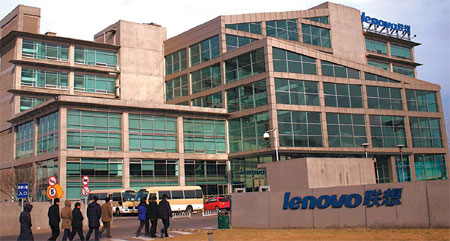
The tea party at the Beijing headquarters of Lenovo to bid adieu to the year of the Rat was supposed to be an informal gathering of senior executives to exchange greetings and, perhaps, a bit of office gossip before heading home for the Spring Festival holiday.
But those who attended, including the company's founder Liu Chuanzhi, who was then chief executive officer of Lenovo's parent, Legend Holdings, could feel a sense of foreboding. "The atmosphere at the party was anything but relaxing," recalled a senior Lenovo executive who was present at that time.
There was really not much for that group to cheer about. Most senior executives knew by then that the 2008 results would be in the red for the first time since they joined the firm.
What's worse, the company's strategic focus on overseas sales seemed to have backfired as the global economy was fast slipping into recession. On the domestic front, the company's stranglehold on corporate and government market remained unchallenged, but its share of the much faster growing consumer market was seriously eroded by foreign competitors with their fancier models.
The root of the computer maker's problems, however, was the bitter infighting between the foreign executives, headed by the then chief executive officer William J. Amelio and the domestic management staff, said a senior executive who did not want to be named. Subsequently, many senior local executives quit the company to join competitors, the source said. Staff morale was further depressed after a retrenchment notice was posted in early January.
Few people who attended the party knew what the top decision makers of the company had in mind. But they got a cue from Liu himself.
Looking imposing even at the age of 65, Liu summed up the company's problems in a short speech: "This is the most critical and difficult time in the company's history. There is something wrong with our corporate culture and our staff morale is at a low point. It's time to rekindle our staff's passion."
He didn't name the person who was going to do that. But many of those present were secretly anticipating Liu to take the helm again.
They didn't have to wait long. On Feb 5, a month after the party, Lenovo issued a statement announcing the appointment of Liu as chairman of the board, in place of Yang Yuanqing, who was named the company's new chief executive officer after the departure of Amelio, a former Dell executive, when his three-year contract with Lenovo expired.
On the same day, Lenovo posted its worst quarterly results in three years, announcing a loss of US$96.7 million for the three months ending Dec 31, 2008 on sales of US$3.59 billion, down 20 percent from a year earlier. The company's 2007 third and fourth quarter profit amounted to US$172 million and US$140 million.
Despite a US$93 million profit in domestic sales, Yang said overall results were hit by the losses in overseas sales and admitted that Lenovo was a "weak competitor" in the US and Europe.
Disappointing results notwithstanding, the day after the announcement of Liu's return, Lenovo shares jumped 10.96 percent to HKUS$1.62 apiece, breaking the long slide which saw the shares losing more than 72 percent in the past year.
"Although it (the change) is almost within our expectations, the news was still so inspiring that many Lenovo staffers said in private that 'Liu brings hope to Lenovo'," the company source said.
Indeed, Legend's board of directors had been toying with the idea of reinstating Liu to the top slot for quite some time. In August 2008, Liu was heard mentioning that Lenovo was his destiny and it was his "duty" to rejoin Lenovo's management team to help the company regain its competitive edge, the source said.
At the age of 40, Liu left his cushy government job to establish New Technology Developer, the predecessor of Lenovo, with an investment of 200,000 yuan together with 10 employees from the Chinese Academy of Sciences. In the ensuring years, the company has firmly established itself as the largest vendor of computer equipment in China, comfortably holding a 30 percent share of the domestic market.
Liu was known to have always harbored a burning desire to shape Lenovo into a major world player. He laid the foundation for global expansion by acquiring the personal computer business of IBM in December 2004 for US$1.75 billion, together with the right to use the "Thinkpad" brand name for five years.
Although the price Lenovo paid was seen in overseas markets to be on the high side, the move was widely applauded in China as "brilliant" or "forward looking". It was hailed by some commentators as a statement of China's resurgence as a global economic power.